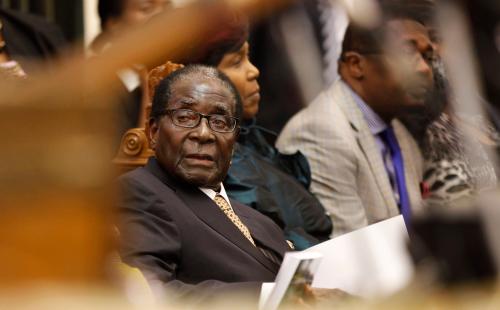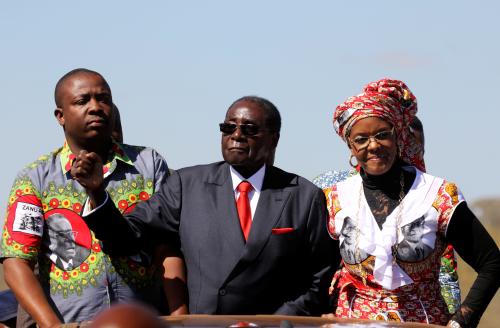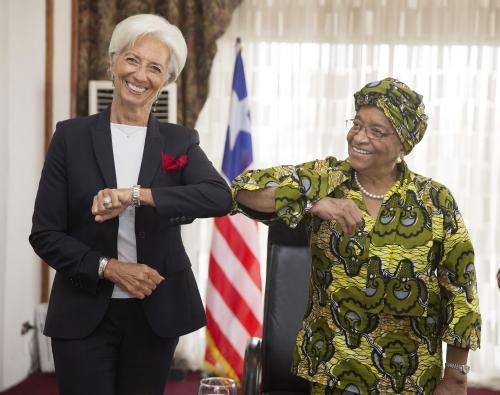IMF removes Zimbabwe’s lending sanctions, and the introduction of bond notes is challenged domestically
This week, the IMF announced the removal of all remedial measures applied to Zimbabwe. The measures, put in place in the early 2000s, removed Zimbabwe from the list of PRGT (Poverty Reduction and Growth Trust) eligible countries and suspended all lending to Zimbabwe after its failure to settle overdue financial obligations. The PRGT is the IMF’s concessional lending arm. Last month, the IMF issued a statement affirming that Zimbabwe settled its overdue financial obligations to the PRGT, a Special Drawing Rights 78.3 million settlement (about $107.9 million). This was done by transferring part of its Special Drawing Rights holdings to the PRGT account, thus settling all financial obligations to the IMF. In its statement, the IMF added that consideration for future loans are subject to two key conditions: Zimbabwe resolves its arrears with other multinationals (e.g., African Development Bank and the World Bank) and implements strong fiscal adjustment and structural reforms. Last summer, Zimbabwe took a first important step towards debt clearing as the African Development Bank agreed to write-off the $601 million the country owes in arrears. Zimbabwe currently owes the World Bank $1.1 billion in arrears.
In September, Zimbabwe announced that the country would be introducing “bond notes” equivalent to the U.S. dollar, in order to tackle cash shortages. On Tuesday, the Zimbabwe Lawyers for Human Rights asked the high court to strike down President Mugabe’s decree which allows for the reintroduction of “bond notes.” The country has not issued its own currency in years, and is currently using the U.S. dollar and the South African rand. Analysts have raised concern over a repeat of the 2009 hyperinflation. The governor of the Zimbabwean central bank estimates that, by the end of 2016, the new bond notes will add $75 million to Zimbabwe’s money supply.
Governments dismissed in the Democratic Republic of the Congo and Guinea-Bissau
In the Democratic Republic of the Congo (DRC), following the constitutional court’s controversial decision to postpone the DRC’s elections to 2018, Prime Minister Augustin Matata Ponyo resigned on Monday. Already, an opposition leader of a minor party, Samy Badibanga, has been appointed prime minister as part of the African Union-backed national dialogue deal struck in late October. According to the deal—forged by President Joseph Kabila’s party, the People’s Party for Reconstruction and Democracy, and many of the opposition groups within the country—Kabila is allowed to stay in power until the now-postponed elections (originally scheduled for this month, but now likely in April 2018), while the opposition groups join his part in creating a government of national unity. Kabila’s stay in power is exceedingly opposed by the country’s largest opposition group—which boycotted the national dialogue—claiming that Kabila looks to stay in power indefinitely.
Also on Monday, President José Mário Vaz of Guinea-Bissau dissolved his government in the wake of a recent ECOWAS communiqué, called the Conakry Agreement, calling for an end to the political crisis in the West African country. Since 2015, Guinea-Bissau has experienced political infighting—fallout from the dismissal of then-Prime Minister Domingos Simões Pereira, leader of the ruling African Party for the Independence of Guinea and Cape Verde (PAIGC). According to Vaz, the Conakry Agreement requires “dismissing the government and naming a new prime minister who will be charged with forming an inclusive government to pull the country out of this crisis.” The new prime minister, who has yet to be named, will be the fifth in nine months.
Pew survey highlights economic discontent, yet optimism in Kenya, Nigeria, and South Africa
A newly released Pew Research Center survey, which examined national attitudes of citizens in Kenya, Nigeria, and South Africa toward their economic and political institutions, found that over the past four years all three countries have experienced an increase in negative views toward their economies—with over half of respondents in Kenya and roughly 70 percent of those in Nigeria and South Africa considering their economies to be in bad shape. According to Pew’s research, majorities in the three countries believe political corruption is a major issue and that inequality has increased over the past five years. In Kenya (64 percent), Nigeria (63 percent), and South Africa (69 percent), citizens believe that jobs only go to well-connected individuals. Meanwhile, more than half of South Africans think that many people do not have jobs because schools do not teach students necessary job skills (61 percent), health problems prevent some people from working (58 percent), some individuals are racially discriminated against (57 percent), and some people lack motivation or are lazy (50 percent).
Still, most respondents from the three nations have a positive outlook on their country’s future: Majorities in Kenya, Nigeria, and South Africa think that their economies will improve in the next year. Furthermore, more than three-quarters of respondents in these countries believe that young people should stay in the country rather than move abroad in order to pursue a good life, and majorities think that citizens can influence their government through political activism.







Commentary
Africa in the news: IMF drops Zimbabwe sanctions, DRC and Guinea-Bissau dissolve governments, and Pew releases African attitudes survey
November 18, 2016